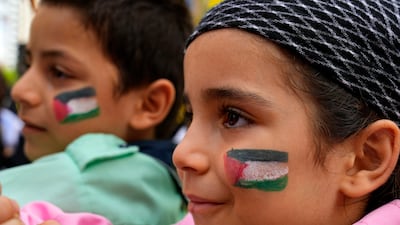Live updates: Follow the latest news on Israel-Gaza
Will Lebanon face war? The question is on the minds of every Lebanese citizen, infiltrating every conversation, even the most mundane.
In Beirut, a palpable tension hangs heavily in the air.
People are glued to their phones, anxiously tracking the constant stream of updates flooding their WhatsApp and Telegram groups. All eyes are on the volatile situation in the south of the country.
Fears that the Israel-Gaza war might spill into Lebanon are rising as violence escalates, with the death toll on both sides nearing 1,600, after Hamas, the Palestinian militant organisation which runs Gaza, launched a multi-pronged assault from Gaza on Saturday.
cafe owner in Beirut
The latest developments have worried some Lebanese, as Israeli forces and Lebanon's Iran-backed Hezbollah militia exchanged artillery and rocket fire, killing three Hezbollah members on Monday, after Palestinian militants tried to infiltrate into Israel from southern Lebanon.
“Of course, we are all scared, even though it is still far at the moment, we are worried it might come closer to us,” said Joelle, a 33-year-old mother who runs a beauty institute in Ein El Remmaneh, in a suburb of Beirut.
“My greatest concern is for my daughter. I don't want her to experience what we've been through.”
She said all her clients are in a state of “panic”.
The war is “all they are talking about, constantly checking social media and watching TV for updates”.
Lebanon has endured a series of traumatic conflicts, notably a 15-year civil war from 1975 to 1990, which deeply scarred the nation and claimed the lives of more than 100,000 people.
More recently, in 2006, a 34-day conflict between Hezbollah and Israel, resulted in more than 1,200 deaths in Lebanon, most of them civilians, and 160, primarily military personnel, in Israel.
The small Mediterranean country has also been grappling for four years with one of worst financial crises since the mid-19th century.
Ousama, 29, who lives in Beirut's southern suburb of Dahiyeh, a Hezbollah stronghold which was targeted during the 2006 war, has also been witnessing “a growing fear,” he told The National.
“My dad came into my room and told me: 'Get your essentials ready because the situation is getting serious.' My boss today came into our office and told us to start taking our laptops with us [in case something happens].”
However, he said he is not afraid, but “overwhelmed with anger and frustration towards what is happening in Palestine”.
“It has been consuming my everyday thoughts,” he added.
Perceptions of Hamas and Hezbollah
Fadi, a 53-year-old who runs a small cafe in Beirut – but is originally from the south of the country, told The National that he noticed a stark divergence of opinions among his clients when it came to their stance on Hamas, which is backed by Hezbollah, and their views on the possibility of war.
This resonates with the broader political division in Lebanon, with one faction favouring Hezbollah and another strongly opposing it.
“It’s the usual politics in this country: that was expected,” he said.
“No one knows what is going to happen, but I believe that there is a 50 per cent chance of war,” he said, drawing parallels to the tense atmosphere that preceded the 2006 conflict.

“I’m personally not scared, I’m only worried for the children and elderly, but people from the south are used to wars,” he added.
Joumana, his sister, is sheltering in her home in a southern border village with her three children and elderly parents, awaiting updates.
Caretaker Minister of Education Abbas Al Halabi on Monday announced the closure of schools in border districts of southern Lebanon from Tuesday, citing safety reasons.
“Everyone in the village is at home, closely monitoring the news: we don’t know what is going to happen,” Jourmana said.
She said she could distinctly hear the sounds of nearby shelling on Monday.
“If anything serious happens, we will evacuate. Inshallah, there is no war,” she said.


